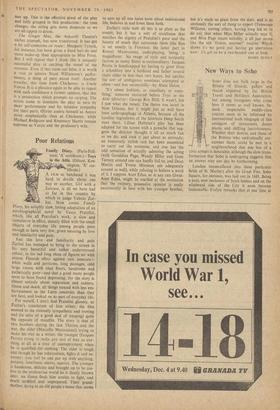Poor Relations
Family Diary. (Paris-Pull-
man; 'A' certificate.)—Toys
A FILM so butchered it was hard to decide about one way or another, Girl with a Suitcase, is all we have had so far in this country by which to judge Valerio Zur- - lini. Now comes Family Diary, his suitably slow, loving adaptation of an autobiographical novel by Vasco Pratolini, which, like all Pratolini's work, is slow and cumulative in effect, densely filled with the small objects of everyday life among people poor enough to have very few, given meaning by love and familiarity and pain.
Just this love and familiarity and pain Zurlini has managed to bring to the screen in his very beautiful and rather understressed colour, in his sad long shots of figures•set with almost Flemish effect against vast interiors— white walls and porticoes, long passages, cold large rooms with tiled floors, handsome and pathetically poor—and that a good many people seem to have found depressing; for the story is almost entirely about separation and sadness, illness and death, all things treated with less em- barrassment in the Latin countries than they are here, and looked on as part of everyday life.
For myself, I don't find Pratolini gloomy, or Zurlini's translation of him either; the film seemed to me intensely sympathetic and moving and (in spite of a good deal of weeping) quite the opposite of maudlin. The story is that of two brothers during the late Thirties and the war, the elder. (Marcello Mastroianni) trying to make his way as a writer, the younger (Jacques Perrin) trying to make any sort of way as any- thing at all at a time of unemployment when he is qualified for nothing. The elder is tough and though he has tuberculosis, fights it and re- covers: you feel he can put up with anything, Poverty, loneliness, sneers, squalor. The younger is handsome, delicate and brought up to be use- less in the proletarian world he is finally thrown into: an illness finds him unable to fight, and death teraified and unprepared. Their grand- mother, dying in an old people's home that seems
to sum up all one hates most about institutional life, believes in and loves them both.
Zurlini's style with all this is as plain as the events, but it has a sort of .stateliness that matches the dignity of Pratolini's poor and the beauty of much that surrounds them (the film is set mostly in Florence; the latter part in Rome). Mastroianni, underplaying, 'being,' is magnificent: his range of style and sympathy (across so many films) is extraordinary. Jacques Perrin is handicapped by having to grow from a schoolboy into a husband and father several years older in less than two hours, but catches the sort of ambiguous sweetness attempted so often—and less successfully—by Alain Delon.
'It's about lesbians, or cannibals, or some- thing,' someone muttered before Toys in the Attic (director: George Roy Hill). It wasn't, but I saw what she meant. The theme was incest in New Orleans, but it might just as well have been anthropophagy in Atlanta, because all the familiar ingredients of the hilarious Deep South were there. Lillian Hellman's play has been adapted for the screen with a panache that sug- gests the director thought it all as much fun as we do, and took it just about as seriously; an immensely stylish cast has been assembled to carry out the nonsense, and one has the odd sensation of actually admiring the acting (with Geraldine Page, Wendy Hiller and Gene Tierney around one can hardly fail to; and Dean Martin and Yvette Mimieux are adequately around as well), while refusing to believe a word of it. I suppose Aunt Edna, or at any rate Great- Aunt Edna, might be startled at the revelation that the twittery, possessive spinster is really passionately in love with her younger brother, but it's made so plain from the start, and is so obviously the sort of thing to expect (Tennessee Williams, among others, having long led us to do so), that when Miss Hiller actually says it, and Miss Page reacts suitably, it all just seems like the old 'Tennis, anyone?' routine. Which shows it's no good just having ;n aberration now: its got to be a two-headed one at leas,t.






























































 Previous page
Previous page